
Compromised By The Secret Police

On September 10, 2019, Kehinde Dada and Joseph Okonofua died at the hands of Nigerian police. The two 23 year-olds were caught up in the violent response of police officers to a student protest in the normally sleepy town of Oye-Ekiti, in Nigeria’s southwestern Ekiti State. Angry about a power outage that had lasted for several months on the campus of Federal University Oye-Ekiti (FUOYE), the protesting students had received word that Erelu Bisi Fayemi, wife of Ekiti State Governor Kayode Fayemi, was in town.
The predictable sequence of events that happened next was par for the course in a country that has witnessed no fewer than 4 state-sanctioned massacres of unarmed civilians over the past 6 years, including one that was livestreamed on Instagram. Acting in the famously restrained and professional manner of the Nigeria Police Force, an officer attached to Bisi Fayemi’s entourage slapped the Student Union president when he tried to approach her, escalating the already tense situation.
As the enraged students surged forward, the Governor’s wife was whisked out of the area, but not before some of her impeccably disciplined and well trained security attachés fired several live AK-47 rounds at the students, ostensibly to scare them away. One of these military-grade rounds hit Kehinde in the eye, killing him on the spot. His close friend Joseph heard the news and ran toward Kehinde’s prone figure to confirm it. Another AK-47 round hit Joseph in the abdomen, ripping open his stomach and exposing his intestines. He did not last much longer.

A fierce media war then ensued, with Bisi Fayemi’s media team putting out a statement that accused the student protesters of being “thugs,” while distancing herself entirely from the 2 deaths. The National Association of Nigerian Students (NANS) promptly fired back, declaring Governor Fayemi and his wife persona non grata across all university and polytechnic campuses in Nigeria.
STAY AWAY FROM AAU, EKPOMA CONVOCATION LECTURE; NANS TELLS FAYEMI.
NANS wish to advise the Ekiti State Governor, Dr John Kayode Fayemi to in the interest of justice, recuse himself from the convocation lecture he plans to deliver tomorrow at the AAU, Ekpoma, Edo State.
Thread. pic.twitter.com/5YuEPDrX9T— NANS (@NANSNIG) October 16, 2019
374KM away on Colorado Close in Maitama, Abuja, a researcher at Amnesty International’s Nigeria office got on the case. Damian Ugwu, a 15-year veteran at the organisation, was no stranger to documenting brutality and disregard for rule of law by Nigeria’s security forces. For decades, Amnesty International has been a thorn in the side of the Nigerian government, documenting human rights violations by successive military and democratic administrations in a series of press releases and special reports.
Known internally as “outputs,” Amnesty International’s publications are often extremely influential in global policy and diplomacy circles, which makes them a unique headache for Nigerian securocrats. In 2017 for example, a letter from AI addressed to US president Donald Trump was credited with halting the planned sale of 12 Embraer A-29 Super Tucano aircraft to the Nigerian Air Force, due to the human rights concerns raised in the letter. More on that later.
Damian knew that getting to the bottom of what happened on September 10, 2019 would be the easy part. The hard part would be to get this research past layers of political and bureaucratic resistance, and publish something that could prove damaging to Kayode Fayemi, who was known to have designs on the 2023 presidential race. Nevertheless, a job was a job and he traveled to Ekiti on a fact-finding mission where he interviewed over 30 students, eyewitnesses and police officers. The output from that mission is available here.

The problem is that it is only available here. This press release was never published or sent to the media. It never made it to the Amnesty website either. In fact, it was only a few months ago when Damian reached out as a whistleblower that I became aware of its existence.
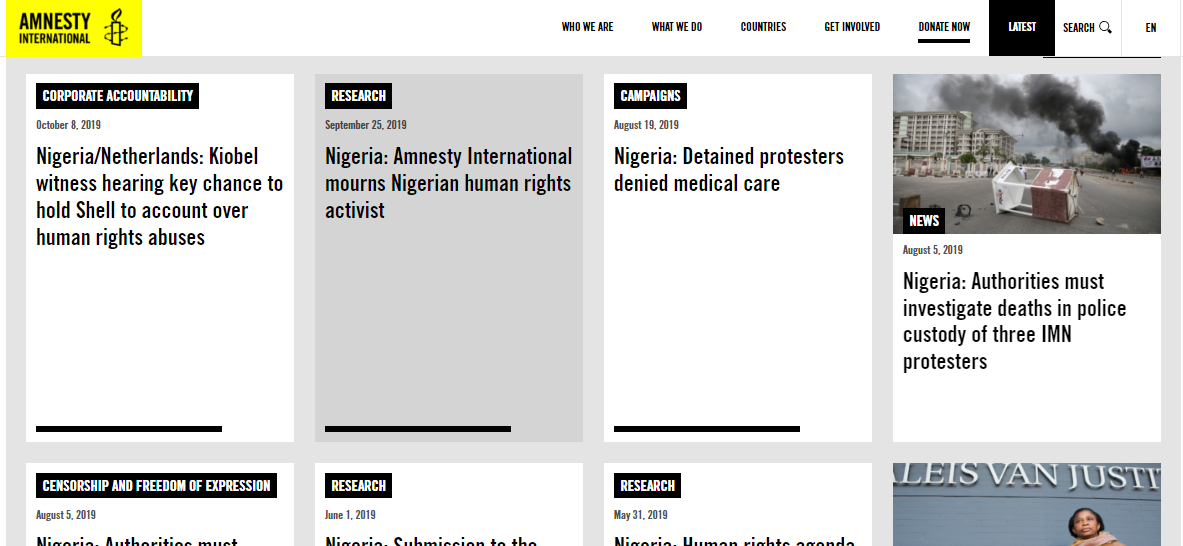
In sharp contrast to what AI’s stated operating principles are, this output seemed to disappear into a black hole. Damian informed me that he felt strongly enough about this to follow up on it almost 2 years after. In the leaked email below, he asked the organisation’s Media and Strategic Communications Manager Isa Sanusi what happened. No answer ever came.

What happened to this important press statement? According to Damian, Amnesty International Nigeria (AIN) Country Director Osai Ojigho broke protocol and simply refused to sign it after it was approved by LAWPOL (AI’s Law and Policy Unit which vets every output to ensure conformity to AI policies and standards). Her reason? Damian says:
“Ms. Ojigho refused to sign the statement on the excuse that the governor’s wife [Erelu Bisi Fayemi] is her friend and former schoolmate.”
Answerable To No One: The Curious Inner Workings Of AIN Nigeria
Since I first established contact with Damian a few months ago, I have had hours of conversations with several past and present staff of AIN. I have also gained access to hundreds of pages of leaked internal documents, emails and letters. The picture that has emerged is one of an organisation that is horrifically mismanaged and unfit for purpose; lacking in any meaningful corporate governance and oversight, and – most importantly – thoroughly compromised from the very top. For the uninitiated, here is a quick explanation of AI’s basic structure:
Amnesty International describes itself as “a global movement of more than 10 million people in over 150 countries and territories who campaign to end abuses of human rights.” As mentioned earlier, its outputs carry a significant amount of weight in international policy, development and diplomatic circles. Outputs from AI have been instrumental in making decisions like awarding foreign aid, permissioning special transactions such as arms purchases, and imposing diplomatic and economic sanctions on individuals and sovereign states. This makes AI a very powerful organisation, and one which wields a huge amount of trust and heft within Civil Society and activist spaces in Nigeria and around the world.
AI has an International Secretariat (IS), which directs the activities of the movement around the world, but it also has independent country offices that have full access to its brand, networks and funding, while being nominally separate and independent from the global entity. In 2015, AI opened a country office in Nigeria, which is where this curious story of extreme managerial malfeasance starts in earnest. Its inaugural country director was a bloke called Mohammed K. Ibrahim, or M.K. Ibrahim as he is more popularly known.

Mr. Ibrahim served as Nigeria’s ambassador to Libya between 2004 and 2008, and has had a long career in Nigeria’s Foreign Service, although verifying exactly what roles he held in the Foreign Service turned out to be quite the task, even for me. It took a segue into a Wikileaks cable from 2008 to confirm that he also once served as Director of the Ministry of Foreign Affairs International Organizations Department Second United Nations Division. Which is a roundabout way of saying that there is a significant non-zero chance that he is a Nigerian foreign intelligence agent. A spy, as that is otherwise known.
Exactly why the decision was made to recruit a possible NIA agent to head the newly formed country office of a major human rights CSO that had long been at loggerheads with the Nigerian security establishment, remains a mystery. In any case, it did not take long for Mr. Ibrahim to show where his loyalties lay in his new role. A letter from AI USA to the US President, which copied Secretary of State John Kerry and Secretary of Defense Ashton Carter, was leaked to the Nigerian government in 2016.
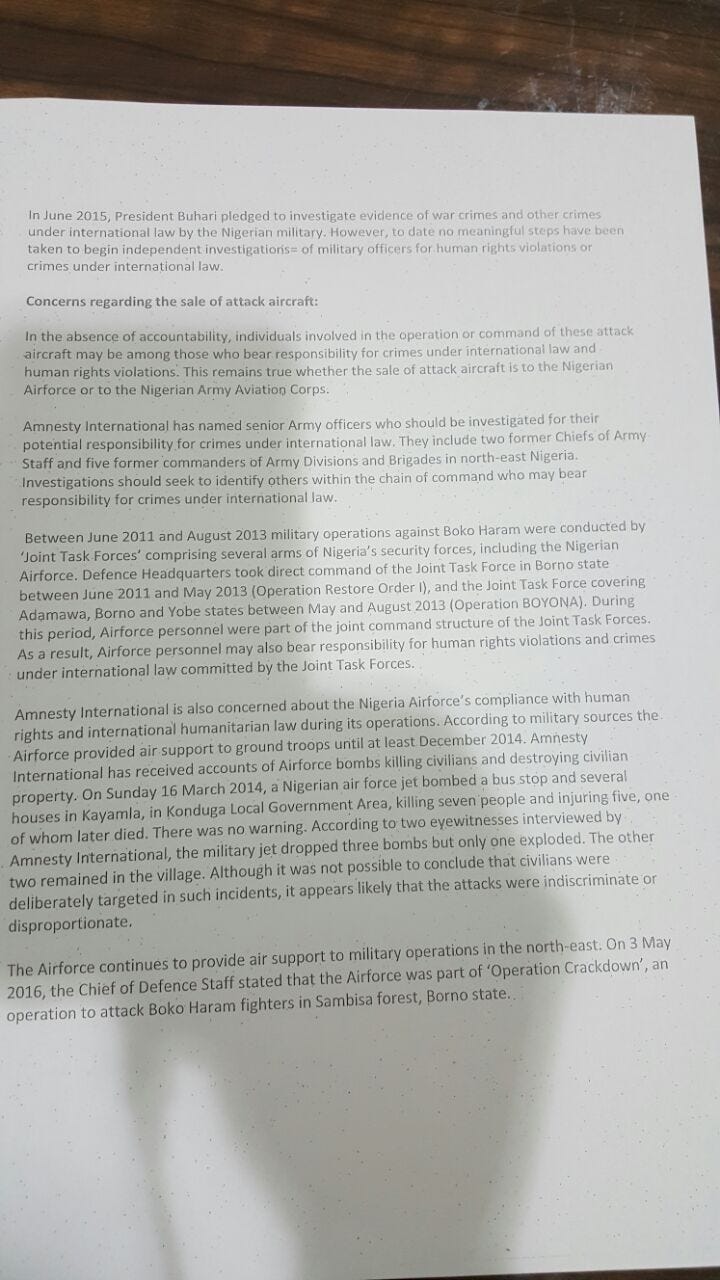


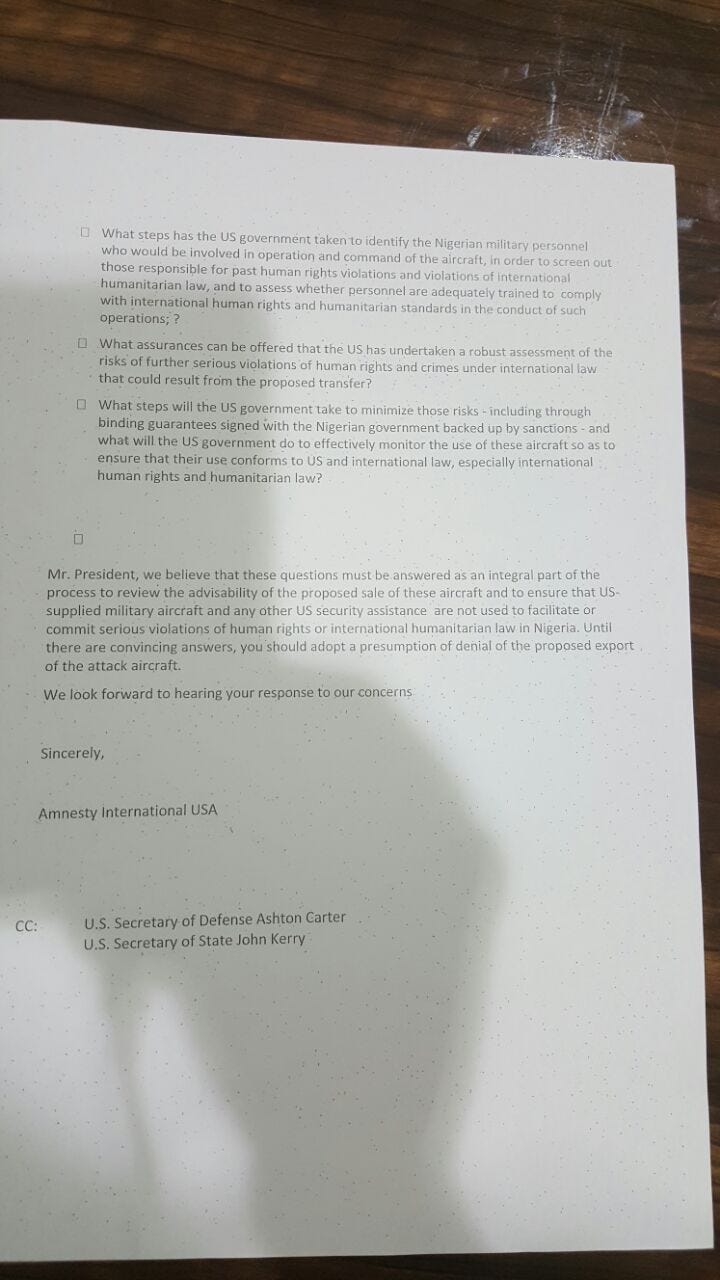
This was the letter that led to the decision to temporarily halt the sale of the A-29 Super Tucano aircraft, so its very existence was supposed to be top secret, especially in Nigeria. The exposure of this letter risked putting AI staff members in Nigeria at risk of persecution by the government. Its exposure was considered such a severe organisational security breach that it resulted in a full in-house investigation. The leak was traced to the Country Director and in June 2016, just 8 months after starting the new job, Mr. Ibrahim was quietly fired and replaced on an interim basis by Makmid Kamara, a Sierra Leonean civil society veteran.
Under Kamara’s leadership, AIN put out several influential reports and documents on topics that the Nigerian establishment did not like. Two of such reports written by Damian covered the activities of the dreaded Special Anti-Robbery Squad (SARS) of the Nigeria Police Force and the deadly crackdown on pro-Biafran activists in Nigeria’s southeast. Keep this in mind for much later where it will become relevant.
Mr. Ibrahim’s story arc doesn’t end there however. Over the next few years, his Twitter account betrayed an increasingly unapologetic stance on everything from disregard for human rights – even openly namechecking his former employer at one point…
Trump to sell 12 A-Super Tucano Attack Planes to Nigeria against strident opposition from Amnesty Int, citing Nig 'human rights violations'!
— MK Ibrahim (@MKIbrahimSenior) April 11, 2017
When Nig wanted to buy some A29-Super Tucano from US, h-rights became an issue. Now Saudis buying weapon of $110 bil and h-r not an issue!
— MK Ibrahim (@MKIbrahimSenior) May 20, 2017
…To his hostility toward the #EndSARS protests against police brutality and violations of constitutional rights…
Some commentators have attributed the “EndSARS” destruction of private properties and public institutions in Lagos, to the massive ‘poverty’ in the country. How come, there was no similar looting, arson and mindless violence reported in the most impoverished parts of the country?
— MK Ibrahim (@MKIbrahimSenior) October 23, 2020
…To even openly flaying UN Deputy Secretary-General Amina Mohammed for upholding human rights for gay people despite being a Muslim.
As a Muslim, Ms. Mohammed shouldn’t be promoting what the Qur’an explicitly prohibits. I believe, if she were not holding UN position, she wouldn’t be promoting Gay Rights in public. Those who engage in this act don’t care about religious injunctions; that’s a dilemma for her!
— MK Ibrahim (@MKIbrahimSenior) July 4, 2019
Amina Mohammed, Deputy SG of the UN has come under attacks in Nig for supporting Gay Rights. The fact is, nobody gets a job in the UN at her position, without signing up for SOGI Rights (Sexual Orientation and Gender Identity). Poor woman, she has traded her faith for plum job!
— MK Ibrahim (@MKIbrahimSenior) July 3, 2019
At the end of this colourful episode came the appointment of a new substantive Country Director, following the departure of Makmid Kamara in December 2016 to a new role at AI in London. In came Osai Ojigho, a hotshot lawyer who came from a gender advocacy background. Around the same time this was happening, an anonymous ex-staffer informed me, major changes were also taking place behind the scenes.
Up until this point, Amnesty International’s presence in Nigeria, whether exclusively using remote researchers or after setting up a country office, had experienced close oversight from the organisation’s International Secretariat (IS). This changed rapidly. Out went all expatriate presence on the Board of AIN, to be replaced by an all-Nigerian team of Auwal Ibrahim Musa Rafsanjani, Barrister Adesina Oke and Nnimmo Bassey.

Devoid of any effective oversight from the IS, AIN effectively became the Country Director’s fiefdom. The current board, I am informed, is well intentioned, but adopts a hands-off management style that favours receiving all of their information about AIN from the Country Director alone. In other words, as averred by all 7 previous and current AIN staff I spoke to, Amnesty International Nigeria is Osai Ojigho’s stomping ground where all sorts of barely believable, unethical behaviour now takes place.
This is where the story gets very intense.
Playing Ball With The DSS And Nasir El-Rufai
The State Security Service of Nigeria (SSS), also known as the Department of State Services (DSS) is one of 3 security agencies carved out of the infamous National Security Organisation (NSO) in 1986 under the Gen. Ibrahim Babangida military administration. For the uninitiated, the NSO was the secret police behemoth during the successive military and civilian administrations of Gen. Murtala Mohammed, Gen. Olusegun Obasanjo, Alhaji Shehu Shagari, Gen. Muhammadu Buhari and Gen. Ibrahim Babangida.
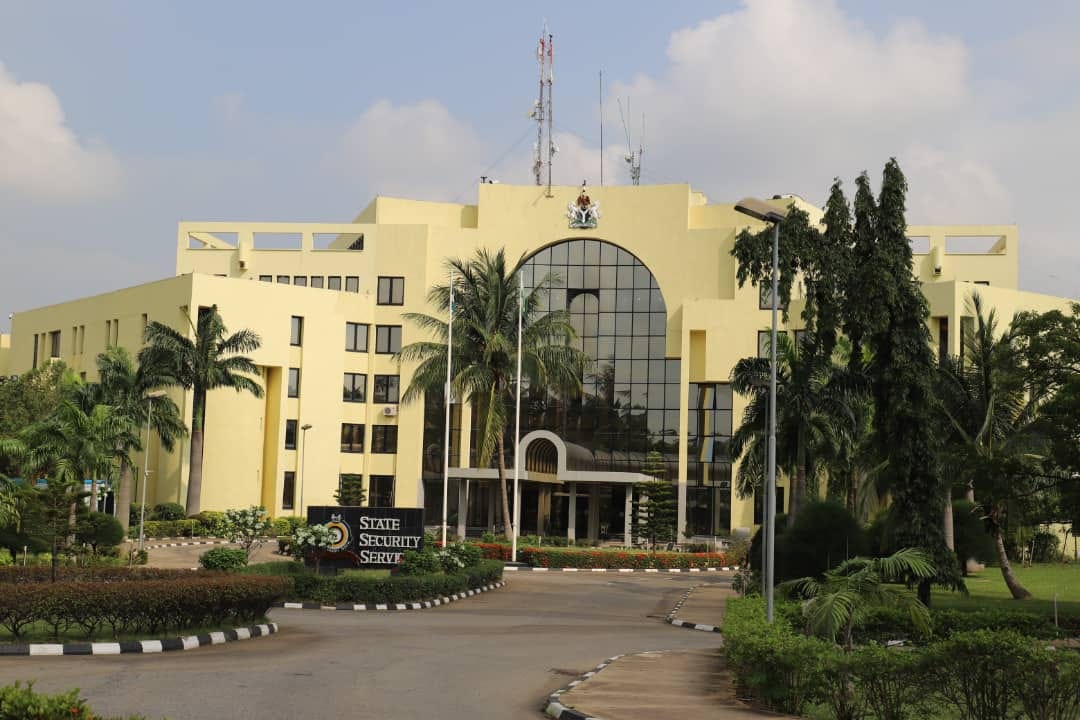
Its colourful history included the attempted kidnap of Nigerian exile Umaru Dikko from London after drugging him and loading him into a cargo crate that only failed to make it onto a specially arranged flight to Lagos because someone neglected to place the necessary “Diplomatic Cargo” label on it. Its largest and best known successor entity is the SSS or DSS, best known for assassinating Newswatch Editor Dele Giwa with a parcel bomb in October 1986. The NSO’s other 2 successor organisations by the way, are the Defense Intelligence Agency (DIA) and the National Intelligence Agency (NIA) referenced earlier.
The DSS says that its job description covers domestic counter-intelligence, internal security, counter-terrorism, surveillance and investigation of some categories of crimes against the state. It is directly controlled by the President, and it is responsible for the personal safety of the President, Vice-President, state governors, visiting foreign government personalities and their families. In American terms, it would be part Secret Service, part FBI, and part NSA all rolled into one opaque corner of Nigeria’s sprawling securocracy.
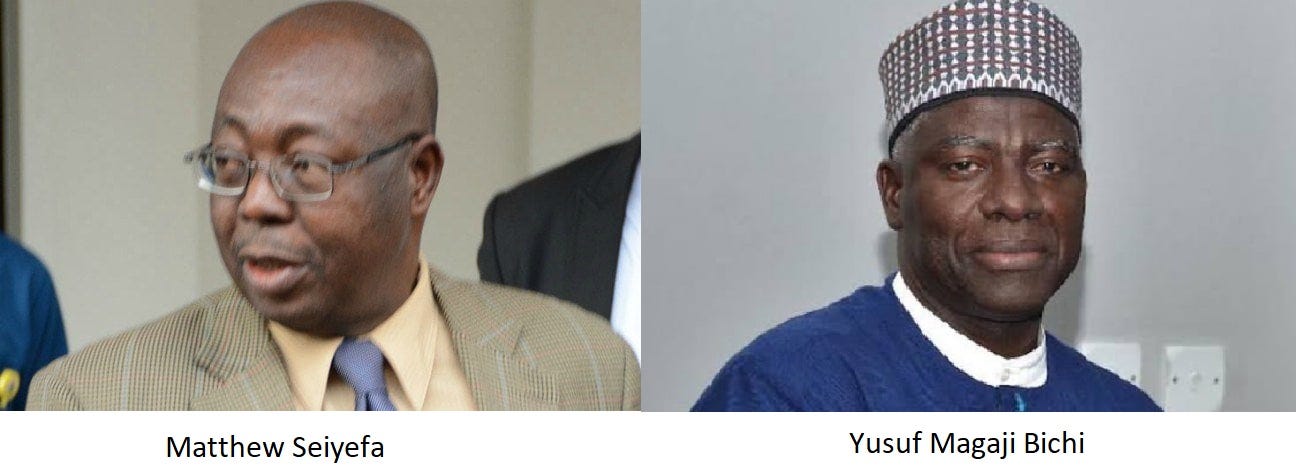
With the appointment of Mathew Seiyefa as DSS Director in 2018, followed swiftly by his replacement with Yusuf Magaji Bichi, the DSS began to pay special attention to AIN’s work. Having seemingly decided that its future lay in preventing news about human rights abuses and security failure from getting into policy circles via organisations like AI, the Buhari administration apparently decided to engage AI directly using a mix of threats, blackmail and inducement. Describing how this began, a current AIN staffer said:
“In October 2018, there was a meeting between a senior DSS official (Director of Research) and Osai Ojigho in Abuja. The meeting was facilitated by a senior civil society actor who had recommended Osai to Amnesty International. The DSS official was interested in ensuring that AI does not pick on them. During the meeting he told Osai, “You guys can say all you want about the police and the military but just leave us alone.” According to my source who also met the official, the DSS is fully aware of all our activities including the profile of staff and our movement and travels. Osai was said to have promised her maximum corporation. Osai also met with a team of serving and retired Army generals.”
Shortly after this meeting, the framed poster at AIN’s office reception depicting the soiled and bloody hands of the Nigerian Army with the title “NIGERIA: Stars on their shoulders, Blood on their hands” was taken down for good.
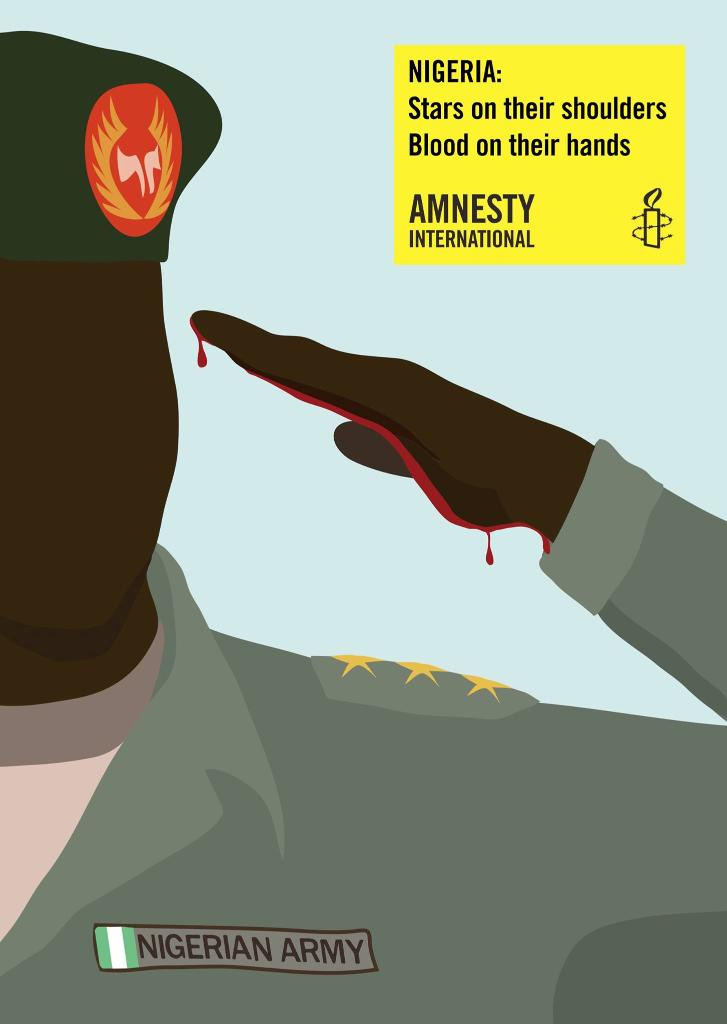
Next would come what this source described as “a series of moves by Osai to emasculate Amnesty International’s critical voice.” Damian confirmed this source’s account to me, further revealing that several press releases (such as that of the FUOYE killings mentioned at the outset) were stepped down, reports were watered down, research missions were cancelled and there were multiple attempts by the Country Director to shift his research focus away from critical coverage of human rights abuses.
Shortly after Osai’s first meeting with security official in Abuja, a security guard whose name was given as “Jubril Matins” was recruited by AIN. Up until that that point, he had been a security contractor employed through Deep Cover Guards, a security company owned by retired Gen. Abdulkadir Shehu Usman. Exactly why a human rights CSO that historically works at loggerheads with Nigeria’s security establishment, would hire a security company linked to that very establishment remains unclear. Keep that in mind because it will be important later.

“Jubril’s” behaviour around the AIN office alarmed his colleagues enough to elicit a security complaint which was sent to the IS. At this point, Damian explains, AIN staff had lost faith in Osai Ojigho’s leadership and were escalating everything – even the small matter of a low level staff member’s suspicious behaviour – to the IS. Describing what happened he said:
“It was glaring that he was a spy. Even while working as a security guard, staff reported seeing him on several occasions with staff files (this was officially reported to the International Secretariat through a whistle blower’s platform in December 2018). On several occasions I caught him eavesdropping on the office. I was also told by two AIN drivers that they were usually debriefed by him any time they took me or any researcher out for a meeting. His intention is to document who we are meeting and purpose of our meeting.”
In August 2019, Osai’s husband, Anthony Ojigho was debarred from practising Law after being found guilty of fraud. (Ref: Anthony Ojigho v. NBA & LPDC (2019) LPELR-46895(SC); [2019] 9 NWLR (Pt. 1678) 399). The erstwhile Real Estate lawyer had fraudulently induced a property buyer into paying N40 million instead of the N30 million requested by the seller, after which he pocketed the difference instead of remitting it.

Explaining the significance of this to the subsequent events at AIN, a source with knowledge of the matter who preferred to remain anonymous said:
“Of course nobody can get hold of hard evidence that the DSS is using the news of her husband’s fraud conviction and consequent debarment to blackmail her, but if I were in the government or security services and I wanted someone in the civil society to be pliant, and I had that sort of dirt on them, then of course I would use it. That is exactly what I would do.”
In any case, the interference with AIN’s human rights work by the Country Director started to come thick and fast after this happened. In October 2019, AIN launched a report on freedom of expression. The report documented the plight of several journalists who were targeted by the government for their work. What nobody outside of AIN has ever known until this moment however, is that shortly before the report went to print, Samuel Aruwan – then Senior Special Assistant Media and Publicity to governor Nasir El-Rufai of Kaduna State – paid a visit to AIN’s Abuja office and met with some members of AIN’s senior management team.
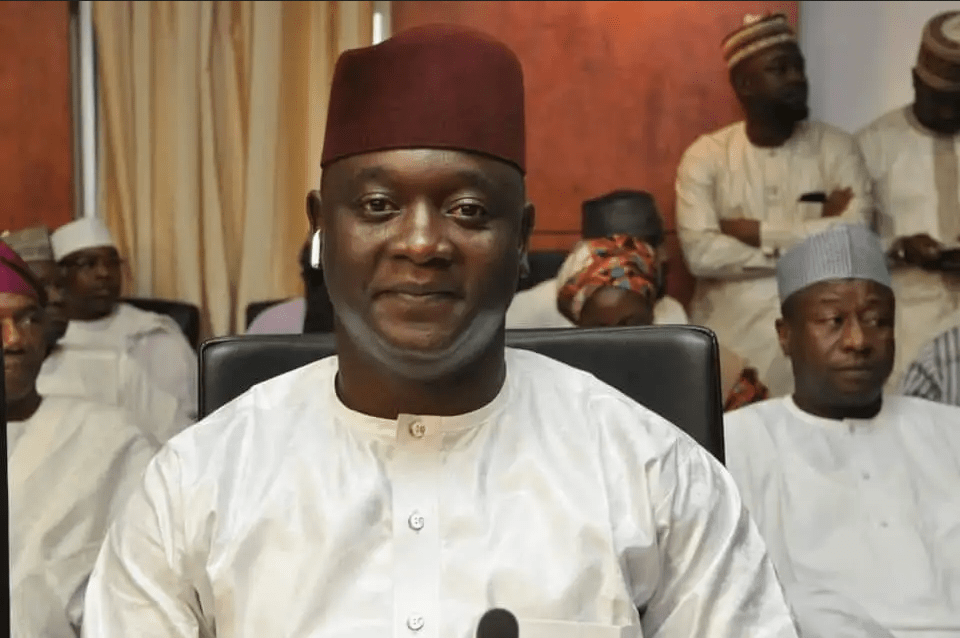
The following day, Damian says, the case of Stephen Kefas, a journalist and activist as well as a strong critic of the Kaduna state government was quietly removed from the report. The flimsy reason given was that his case was before the court and “would not be proper” to include it in the report. Stephen Kefas would go on to spend 145 days in Kaduna Prison without any intervention by AIN.

Damian as well as several other sources confirmed to me that Samuel Aruwan subsequently became a regular visitor to AIN office, while AIN’s media manager Isa Sanusi in turn became a regular visitor to the State House in Badiko. The net effect of the unholy alliance between a journalist-turned-PR flunky working for governor Nasir El-Rufai, and senior management including the Media Manager and Country Director at AIN, is that since 2019, AIN has consistently kept mum regarding human rights abuses by the Kaduna state government, especially regarding the regular mass killings in Southern Kaduna.
Multiple sources confirmed that Aruwan’s most recent visit to AIN was on 16 November 2021 when he came to ensure that AIN did not speak out against the detention of Luka Binniyat, another journalist and critic of Kaduna state government who was jailed by Nasir El-Rufai. When a staffer raised Luka Binniyat’s detention case during a staff meeting the following day, Damian recalls, Isa Sanusi quickly interjected and said that the matter should be stepped down as he is currently investigating the incident. That was the end of the matter and Luka Binniyat would go on to spend 92 days in detention before being granted bail on February 3, 2022.
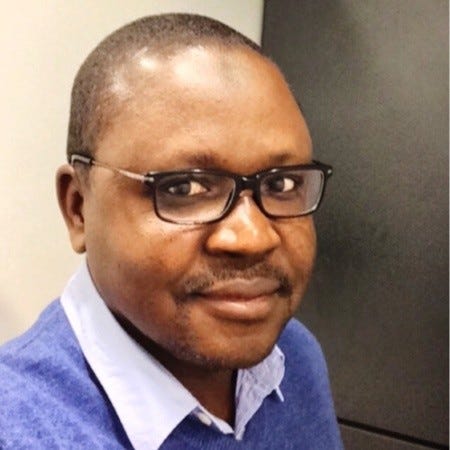
The following is an excerpt from Damian’s lengthy testimony which was authenticated by 3 other sources who currently work and used to work at AIN:
On 20 November 2019, Amnesty International declared Omoleye Sowore, Agba Jalingo and Olawale Bakare as prisoners of conscience. Osai Ojigho, who was on leave but apparently under pressure, immediately rushed back to the office in a bid to reverse the decision. She tried to put pressure on the programs manager, Seun Bakare who was acting as the country director during her temporary absence to withdraw the public statement about Sowore, saying she has been informed by her source in the Vice President’s office that Sowore is fronting for Bola Tinubu, the APC leader.
It was too late to reverse the decision but she subsequently ensured that AIN did not carry out any follow up campaign to seek their release. Sowore and Bakare were released a few weeks later. On 12 February 2020, the duo announced that they intended to visit AIN office to thank AI for their support. Osai who was on leave, called Sowore several times asking him to postpone the visit until she comes back but Sowore insisted he will visit the office as scheduled, offering instead to repeat the visit when Osai is back from leave. The visit went on as planned.
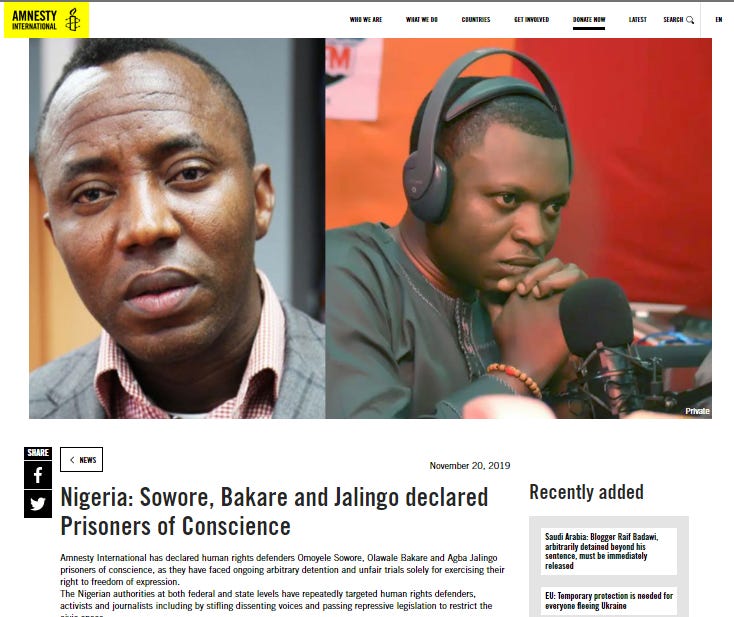
A Forbidden Report, A Stolen Hard Drive And What Happened Next
So far in this story, the case against Osai Ojigho has been largely built on second hand or circumstantial evidence. It is possible that Damian and the other whistleblowers have not been truthful. It is possible that the events described above are simple mistakes or coincidences. Even if Isa Sanusi has been directly implicated as a government collaborator, that does not have anything to do with Osai, does it?
This is where the events of early 2019 come in. At this time, Damian had been working on a report about enforced disappearances, torture, deaths in custody, extra judicial executions and arbitrary detentions by the DSS since 2015. He had documented hundreds of these cases, and once released, this report was going to be the definitive, once-and-for-all proof of what everyone in Nigeria already knows about the DSS – that it employs the same tactics as your garden-variety African bush militia, save for the fancy Tavor rifles, bulletproof vests and flak helmets.
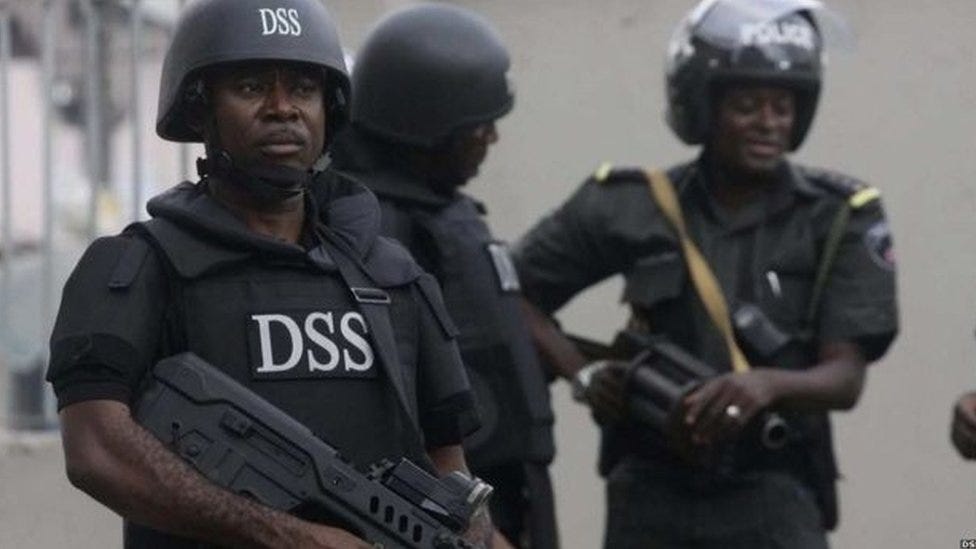
Needless to say, as soon as Osai got wind of this report, she ensured that it never saw the light of day. That is, until today anyway. It is now available in full here, unencrypted and unredacted to the glory of the internet. You’re welcome. Back in February 2021 however, the world was a different place. Recall earlier in this story where I mentioned Damian’s report about the aftermath of the deadly crackdown on pro-Biafran protesters? Here is where that bit becomes important.
The process of researching and drafting an Amnesty International report on a human rights violation is a comprehensive one that involves complete documentation of victims because their stories must be verifiable. Every AI research report follows the exact strictures of an academic research report, down to referencing, identification and sample sizes. It so happened that doing such a research paper about the so-called Indigenous People Of Biafra (IPOB) who suffered multiple massacres, would entail gathering sensitive information about these people – information that an entity like the DSS would certainly love to have.

Sometime in February 2021, the AIN office suffered a break-in – the same AIN office guarded by a security company owned by an ex military general, remember. Expensive computer equipment and other valuables were not touched. The only items stolen were a few sensitive documents, the AIN external hard drive (with all the organisation’s work since 2000 saved on it), and the official hard drive that Damian stored all of his work on – all of his work. Describing the information contained on the drive, Damian says:
“This drive contained the details (names, addresses, phone numbers) of our contacts, witnesses and victims of abuses we Amnesty have interviewed since the 1990s even before we set up an office. I wrote severally to AIN management asking for investigation but was ignored. The scary thing about the loss is that shortly after my hard drive which contained the interviews of all the victims, activists, and witnesses to human rights violations including members and leaders of IPOB, there was a massive arrest of IPOB members in the south east.”
A little bit of digging showed that the story checked out.
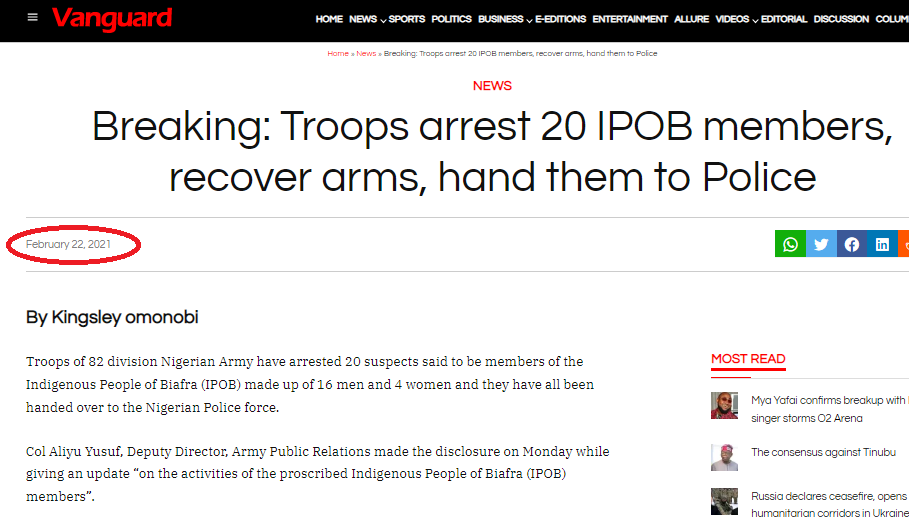
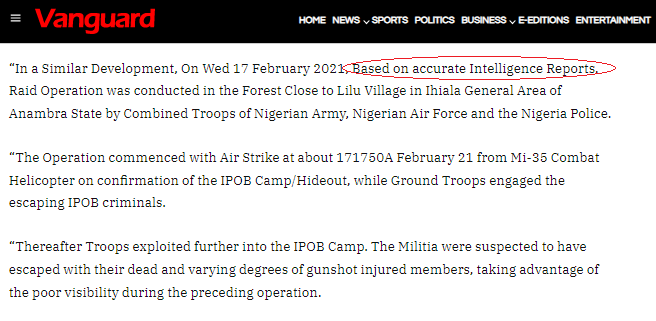
Apparently satisfied with the “accurate intelligence reports” afforded by the research on AIN’s hard drive the security establishment literally came back for more. In March 2021, the DSS wrote a secret letter to AIN requesting for “collaboration.” Of course it did not take two glances for anyone who read this letter to know what it actually meant – “We want all your information.”

Osai, incredibly, responded favourably, welcoming the partnership. When Damian and several others repeatedly tried to get written clarification on what this “partnership” between a lion and a sheep meant for their work as human rights researchers, Osai responded with one of her favourite tools: stonewall silence.


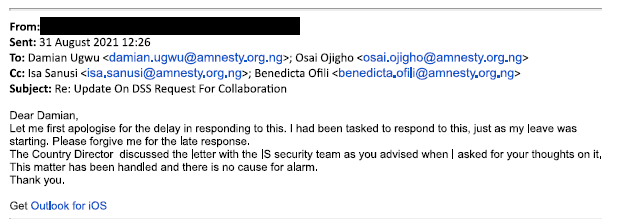

Worse still, Osai then blatantly attempted to bait Damian into giving up his sources during a research expedition to document the invasion of Yoruba separatist leader Sunday Igboho’s home. The email exchange below outlines how Osai’s instructions to pass across names, identities, meeting dates and detailed interview notes comprehensively violated Amnesty’s “Do No Harm” policy by explicitly exposing Sunday Igboho to capture by the Nigerian authorities if carried out.



Management-level shenanigans at AIN got so bad at one point, that Media Manager Isa Sanusi started lying to colleagues in Nigeria and at the International Secretariat about issuance of press statements, necessitating the extraordinary step of going above his head to inquire about issuance directly from IS.
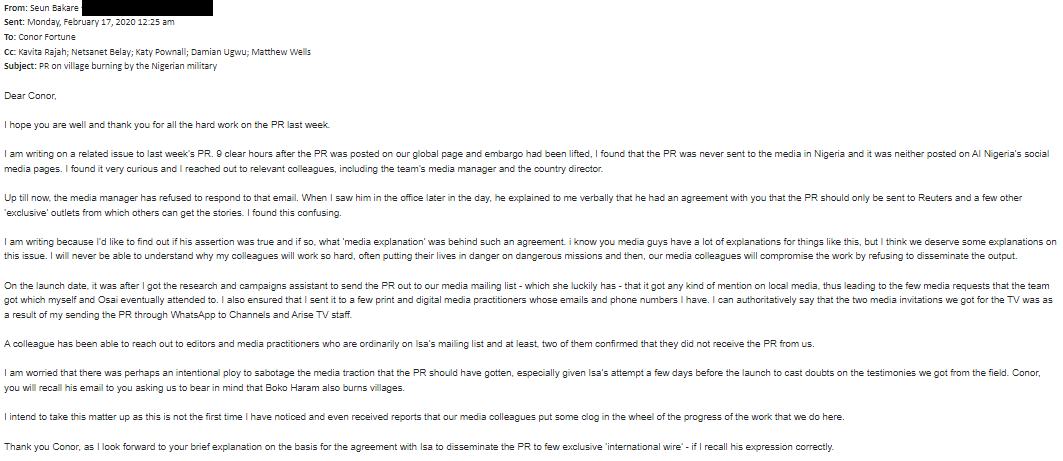

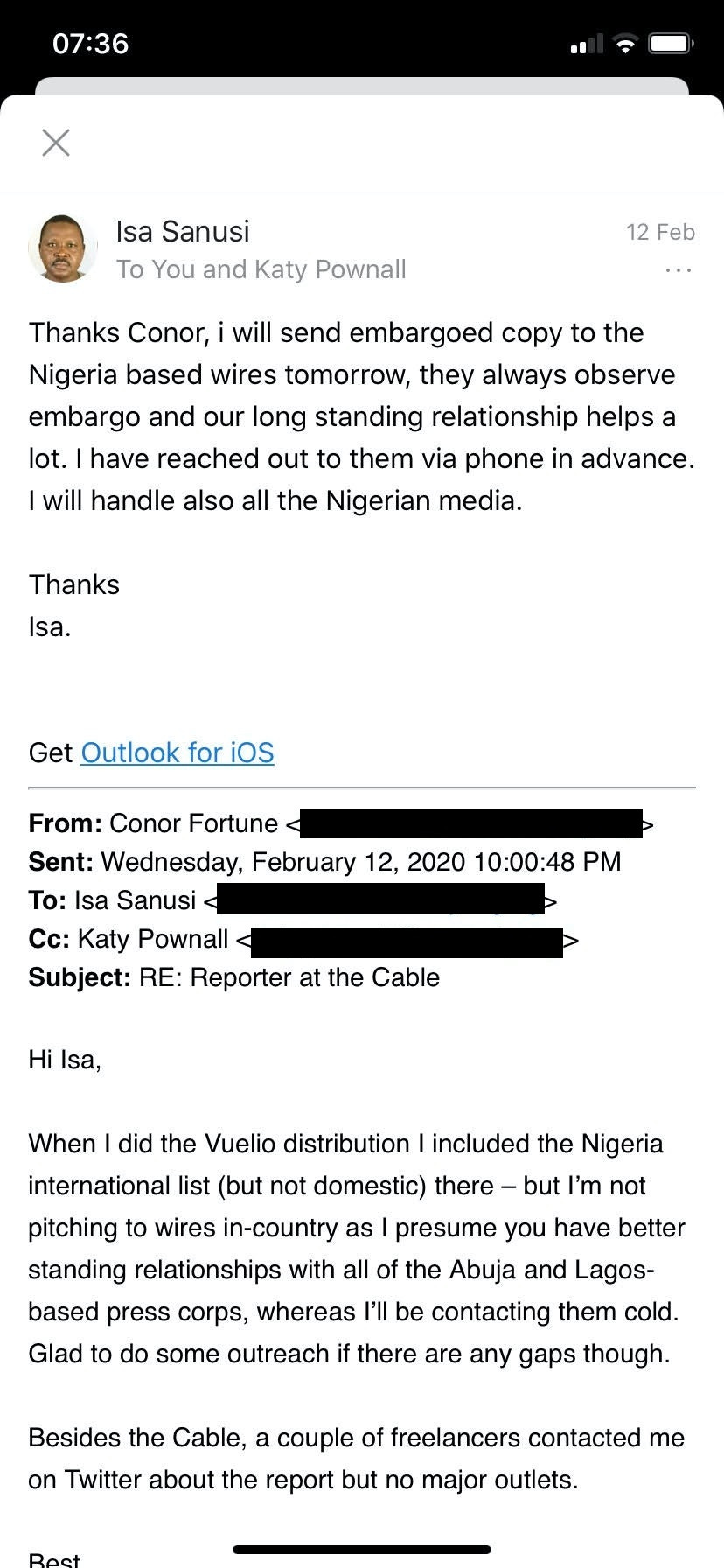


Don’t worry, it gets worse.
It always gets worse.
Damian explains how in his own words:
“On January 29, 2020 I wrote a letter to the management, asking for investigation of Mr. Jubril Matins, the front desk officer and former security guard after I caught him repeatedly spying on me and other colleagues. I also called for the investigation of Osai Ojigho over her meeting with the DSS. After several months of prevarication, some staff were mandated to review the office CCTV. The multimillion-naira CCTV was “discovered to be faulty” and could apparently only record 4 hours of video.
After several reminders, a panel of three management staff was set up. The panel submitted its “findings” in January 2021, declaring my allegations unfounded. The panel members by the way, did not know how or when the report was written. The report in fact, was written by the Country Director herself.
In May 2021, A new researcher Abba Sanusi Jnr was recruited as a conflict researcher. He was not subjected to the usual competitive recruitment process as stipulated by AIN policy. About 350 other candidates applied for the position. Staff were told that his name is Abba Aminu, a former lecturer. All his official documents bear the same name (Abba Aminu).

He lacked any basic knowledge about human rights. However, staff noticed that he had special interest in our work on IPOB despite the fact that his work schedule is focused entirely on conflict in the north.”
In case you haven’t figured out that “Abba Aminu” aka Aminu Hayatu aka Abba Sanusi Jnr. is in fact a poorly-disguised DSS operative embedded at AIN, the screenshots below might fix that.

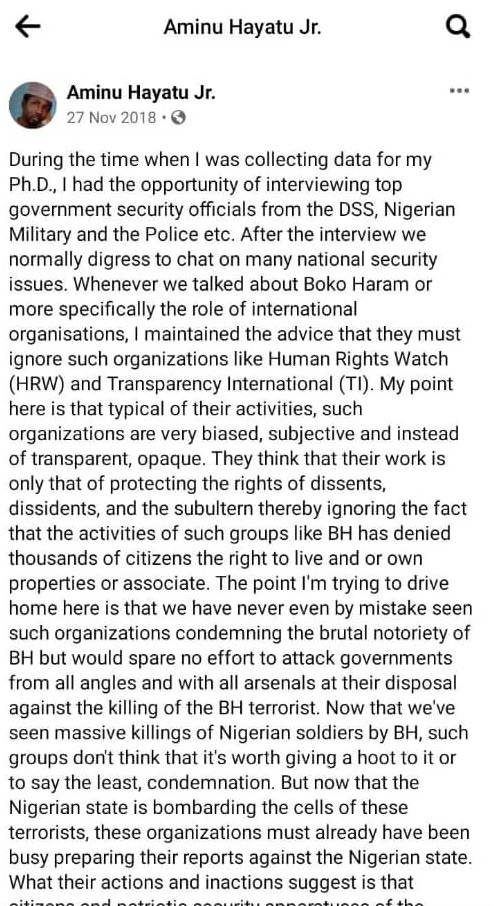
The coup de grace is a leaked email exchange below, where Osai instructed Amnesty International Nigeria staff to refrain from tweeting with their personal handles or even reference use of VPNs. This was in keeping with last year’s illegal Twitter ban – a ban that AI itself urged Nigerians not to observe.

Intimidation, Petitions, Staff Exits and “Racism of Low Expectations”
The quote came to mind when another ex AIN staffer I spoke to provided the following anecdote about Osai Ojigho. According to him, during a December 2018 meeting with several Nigerian senior military officers, Osai was said to have broken down in tears saying. “I just want to earn a living! I am the breadwinner of my family!”
The fictional Dolores Umbridge saw cooperation with Lord Voldemort as doing what she had to do to get ahead individually. The German civil servants who took censuses of Jews in the late 1930s, knowing fully well what that data would be used for, fall into the same behavioural archetype. By all accounts, this is the same category Osai Ojigho falls into.
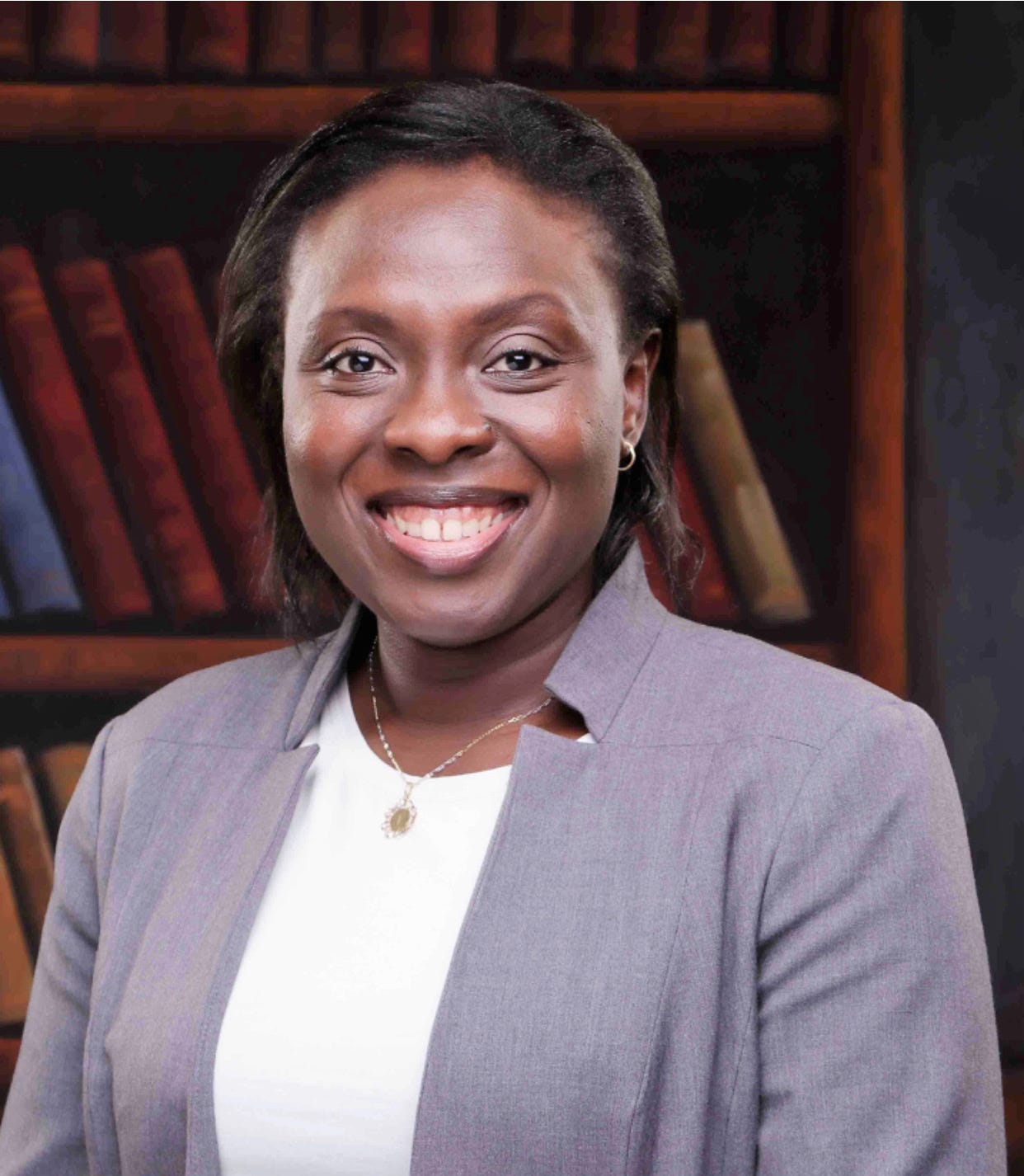
From the pages upon pages of incontrovertible evidence and hours of oral testimonies, it is clear that unlike M.K. Ibrahim who dripped open disdain at the primacy of human rights, and was a fully signed up member of the Nigerian securocracy, Osai Ojigho is not the bogeyman. She is rather the bogeyman’s willing enabler – a bureaucrat who perhaps does not actively hope to see people shot dead, but will happily write the requisition for the carpet bloodstain remover when they do. Every account or testimony of working with her paints the picture of a ruthless, amoral careerist who does absolutely whatever it takes to get ahead, regardless of whatever external costs it might have, and who cares about nobody and nothing beyond herself.
What every single verbal and written testimony attests to is her fabulous skill at using the mechanics of office administration, workplace politics, officiousness and assorted busywork to completely drown out the actual job to be done as a human rights organisation. Apart from having the desired effect of neutering a previously credible human rights CSO, it also creates a constant plausible deniability. Instead of telling staffers that their work is frankly not wanted or needed since AIN now works for the government, her style is to frustrate them out of AIN using a mix of stonewall silence, supercilious email etiquette and infuriating faux professionalism delivered in an unending stream of banal, meaningless corporate-speak.
Damian recalls with some audible frustration that in addition to the above events, Osai’s refusal to allow AIN even pretend to do its work extended to the killing of over 70 people in Oyigbo, Rivers state in October 2020, the post-election killings in Rivers state in February 2019 and the #EndSARS killings in October 2020. It got so bad, he recalls, that former AIN conflict researcher Malik Samuel decided to resign citing the obvious and increasing censorship of his work. I managed to get a copy of the resignation email and the full text is available here. It’s really something, to say the least.


Every whistleblower I spoke to, mentioned that multiple petitions have been written to AI’s International Secretariat on the subject of Osai’s censorship and emasculation of the once fearsome institution. I got hold of a screenshot from one such petition below.

All of these messages, petitions, investigations and internal reports so far, have added up to absolutely nothing. For now, Osai Ojigho remains fully in control at Amnesty International’s Nigeria office, where the DSS – that famously law abiding, venerable and human-rights-respecting institution – is an editorial partner, and Nasir El-Rufai is a close friend of the house. There are many theories and reasons for why this may be. Of all of them, it is perhaps the explanation volunteered by the third anonymous whistleblower below, which would appear to hold the most water.
Anonymous Whistleblower 1
My first shock was when the case of Mubarak (the man who allegedly blasphemed against Islam) came up. She called a meeting and said we should write nothing about it. Osai openly said we shouldn’t speak about things that would cause trouble. When Seun Bakare the program manager opposed this, she came up with the excuse that religion is combustible and people might get hurt. The man was facing a death sentence.
The second incident that shook me was during the #EndSARS campaign. AIN researchers wanted to go to the field to conduct a proper investigation. Osai opposed every move made to realize this. I can assure you that AI never went to the field. As difficult as it is to say, the numbers we quoted were guessed to the best of my knowledge. Maybe a few phone calls to back it up. I am definitely not mistaken because we jumped with joy when numbers of casualties, quoted by other organizations tallied with ours.
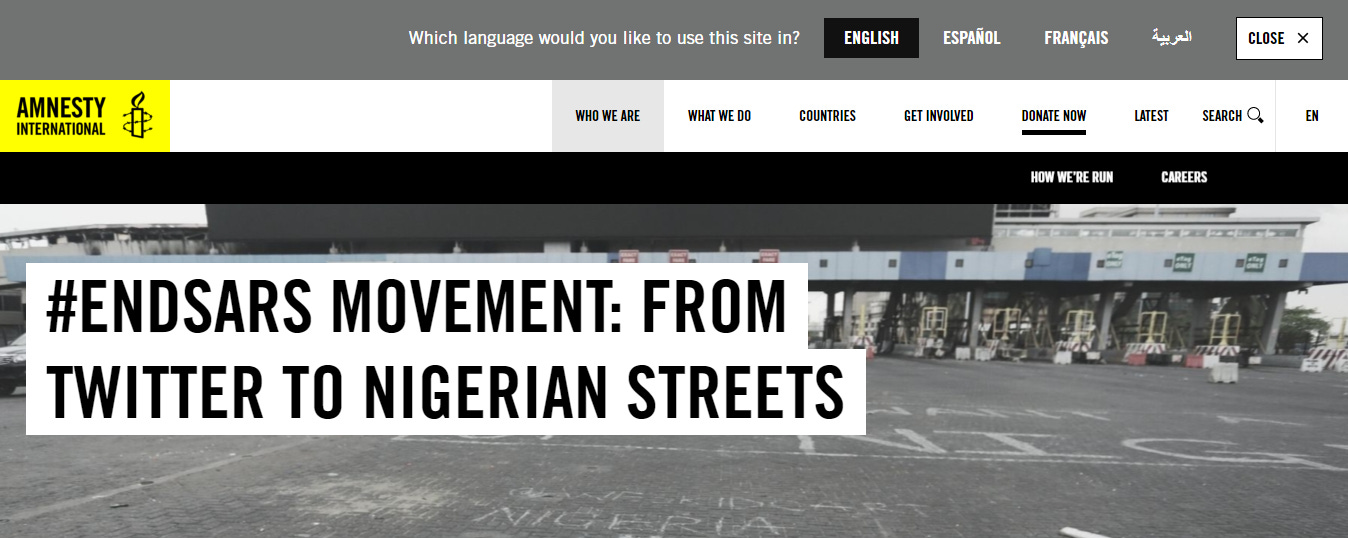
Damian was going to release a report on the DSS. I have never seen such resistance from Osai. She kept creating hurdles to frustrate the completion and release of that report. I strongly believe that the fear of that report led to the termination of Damian’s employment. I don’t know if he knows this. I was shocked beyond words when she announced that DISS had written AI and would want to cooperate with us. Damian raised very vital questions concerning this. My suspicion about her relationship with the govt became clearer when she opposed my research missions to Maiduguri. I was interviewing victims of Boko Haram and the military.
I think this was the beginning of her dislike for me. I concluded that mission and reported to the International Secretariat event though she opposed passively. Her hands were tied since I was getting instructions from the IS. Much later, she employed a conflict researcher. This guy had treacherous statements about AI in his social media timelines. I believe some of my colleagues have a screen grab of his Facebook posts. It was obvious he was planted to stall AI work in the North East. I know she was so afraid of us doing any work on the north east.

Anonymous Whistleblower 2
I know she was so afraid of us doing any work on the north east. There was a particular guy that had played a role in one of our events marking enforced disappearance day. It is usually celebrated on 30 August. So, this guy, whose brothers had been arbitrarily detained by the SSS and were featured in our event, got picked up by the SSS one day. We didn’t call for his release because his family wanted to use some back channel to get him released. He was released after some months. So, he decided to come to the office to see us, knowing we had wanted to campaign for his release but his family had thought otherwise.
He was apparently trailed to the office by suspected SSS operatives. When he stepped out of the office, he walked back in and said he wanted to speak with me. So, he gave a detailed description of the car that trailed him. He had seen the car before even coming to our office. Mind you, this guy had dealt with SSS for years, in Abuja and Kaduna, during the course of trying to get his brothers released. He’d interacted with them. So he knew what he was saying about having been trailed to the office.
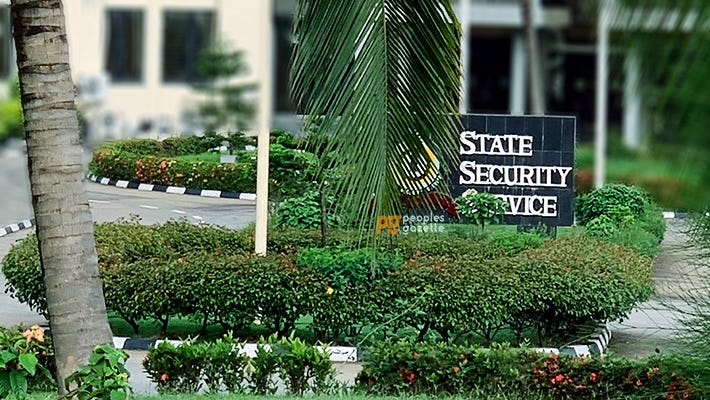
After he left. I decided to report to my line manager and Osai so that we could review the CCTV camera to see the car and see how long that car had been coming to the office, if any. The least I expected was for the CCTV to be checked. To my disappointment, it never happened. My line manager had thought it was a good idea for security reason, but Osai never gave the ok. She just said she would get back to us but never did.
Anonymous Whistleblower 3
Several people have reported and written petition after petition after petition to IS, but the message from there appears to be that we should “bring evidence.” The type of evidence they are talking about is things like recordings of her selling organisational secrets to the DSS and photographs of her receiving payoffs from the government or something – which are impossible to get. Osai is a very smart person. She will generally not oppose you directly when you are trying to do something relating to the mission of AI. She will instead use office managers to frustrate you until you get tired of the constant roadblocks and give up.

As to why she is so powerful and seemingly above oversight in AIN, this goes to the heart of why AI is a fundamentally broken institution. There is the IS, and country offices, but there are 2 types of country offices. There are the ones that report directly to IS, and there are the ones that are registered as independent local organisations – but get to use AI’s brand and funding. The Nigeria office formed in 2015 falls into the second category. Basically, this office gets almost $1 million worth of funding from IS every year, with almost no practical oversight.
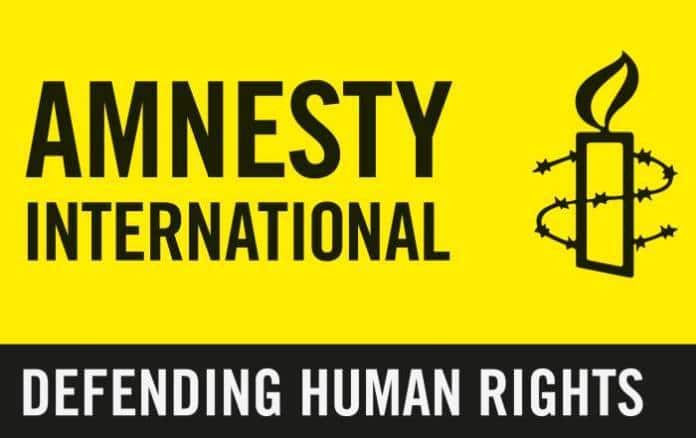
Many people have written petitions to IS regarding Osai’s dangerous closeness with government and security agencies, her unexplained hiring decisions such as the decision to hire an obvious DSS agent as a conflict researcher, and her refusal to investigate serious internal security breaches such as the loss of the company’s external hard drive with sensitive victim information on it.
On at least one of these occasions, what we heard was that some of Osai’s friends within the system then wrote to IS essentially telling them to ignore these black people and their petty dramas. AI has to have some sort of presence in Nigeria, but there is no real oversight to regulate the behaviour of AIN senior management because professional behaviour of the highest standard is not even expected of Nigerians. I guess you could call this “the racism of low expectations.”
Read more: Flutterwave: The African Unicorn Built On Quicksand
1 Year After #EndSARS: Where Are They Now?
About The Author
Related Articles
Trump’s Greenland Threat Forces Europe to Taste the Logic of Western Colonial Power
It rarely begins with soldiers. More often, it begins with a sentence,...
ByWest Africa WeeklyJanuary 21, 2026Tinubu Government Claims Intelligence Cooperation With the US, Yet New York Times Publishes Conflicting Story Following $9 Million US Lobbying Effort
When the New York Times published its investigation suggesting that claims from...
ByWest Africa WeeklyJanuary 19, 2026Malian Army Conducts Successful Surveillance Operation in Mopti Region
The Malian Armed Forces have carried out a successful territorial surveillance operation...
ByWest Africa WeeklyJanuary 19, 2026Niger’s Security Forces Record Major Gains Against Armed Groups
Niger’s Defence and Security Forces have reported significant results following a week...
ByWest Africa WeeklyJanuary 19, 2026








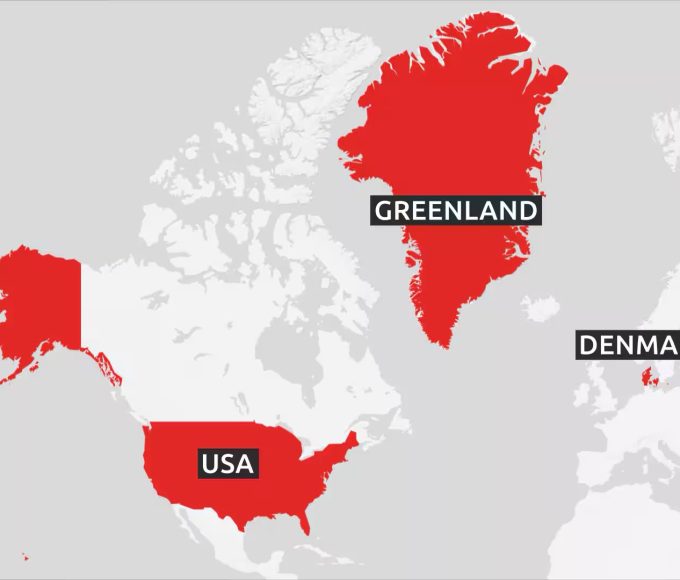
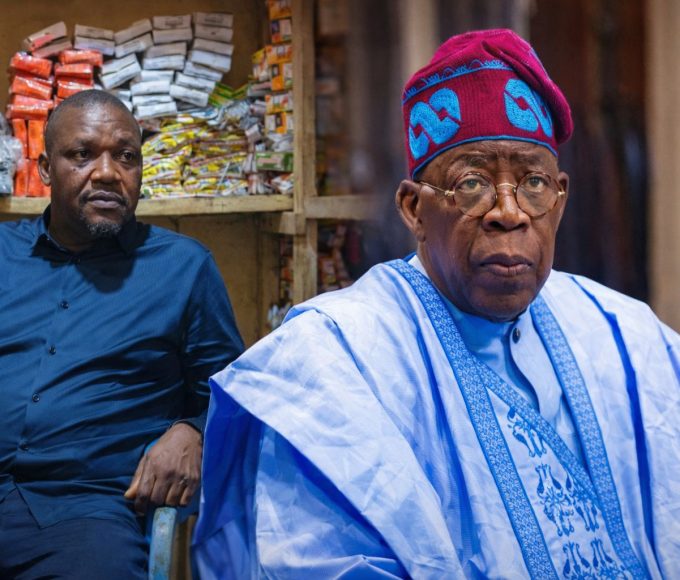

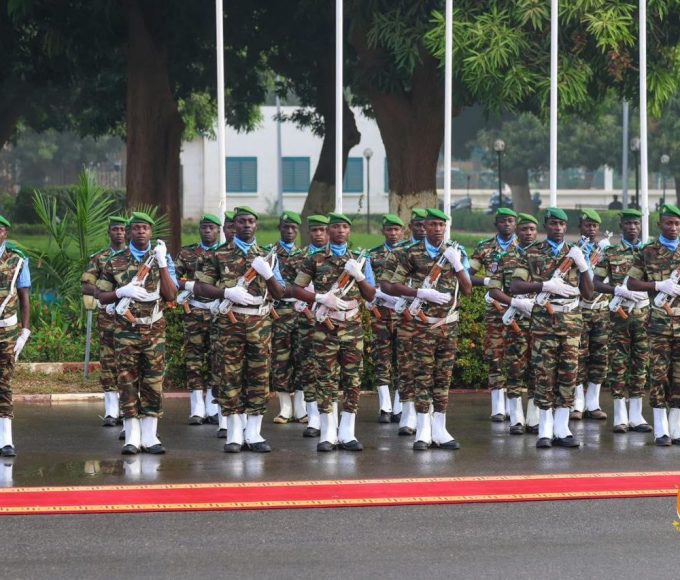
Leave a comment